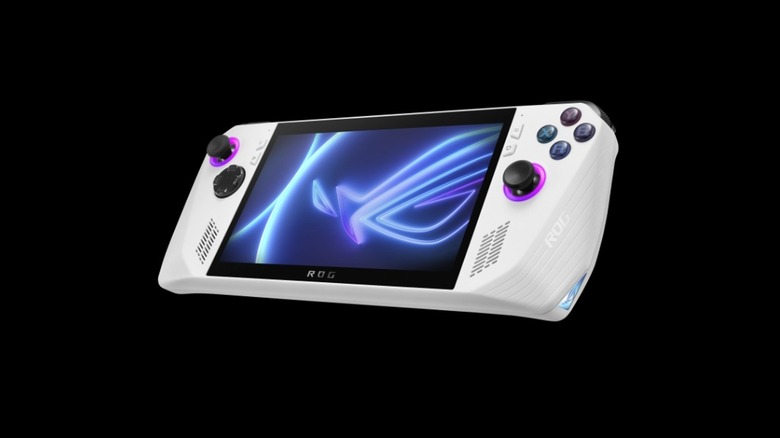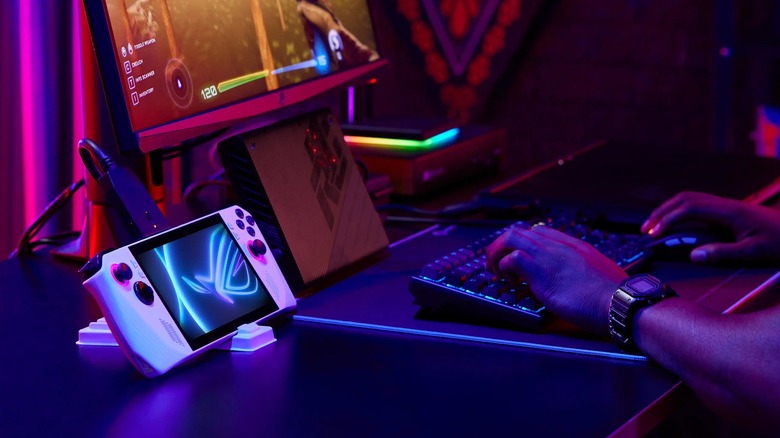This Is One Of The Best Steam Deck Alternatives For PC Gaming (According To Users)
We may receive a commission on purchases made from links.
When the Steam Deck launched early in 2022, it was unclear what impact it would have on the video game space. Steam is known primarily for its outstanding online gaming platform that offers around 30,000 titles, frequent sales, and a straightforward refund process. There are even multiple ways to customize your Steam profile just for you, which helps the site stand out from other digital marketplaces.
There are three Steam Deck models ranging in price from $399 (with 256GB storage and LCD screen), $549 (512GB storage, greater battery capacity, and OLED screen), and $699 (1 TB of storage, OLED screen, greater battery capacity, and other extras). In 2023, Valve designers Lawrence Yang and Pierre-Loup Griffais told The Verge that Deck sales were in the "multiple millions." However, judging by some of the biggest complaints and regrets Steam Deck owners have with the portable PC, it might not be for everyone.
Fortunately, there are some alternatives, including one from notable computer hardware manufacturer ASUS, called the ROG Ally (Extreme Processor version). Not only is this device comparable to Steam's offering, but there are several things the ASUS ROG Ally can do better than the Steam Deck. Out of more than 8,320 user reviews on Best Buy, the ROG Ally (Extreme Processor version) sits at a 4.4 out of 5 stars with an 88% recommendation rate.
ASUS ROG Ally (Extreme Processor) specs and capabilities
The ROG Ally has an AMD CPU, the Ryzen Z1 extreme processor, that features eight cores, 16 threads, and speeds up to 5.10 GHz. It also includes a Radeon RDNA 3 GPU, with 12 compute units running speeds maxing out at 8.6 Teraflops. The ROG Ally display is a 7-inch IPS touchscreen with Gorilla Glass, and a resolution of 1920 x 1080 at a 16:9 aspect ratio. Vitally, the display offers a 120Hz refresh rate and FreeSync Premium technology for less screen tearing. In addition, ROG Ally has 16GB of LPDDR5 RAM, with a 512GB M.2 solid state storage drive.
In terms of performance, the ASUS ROG Ally makes a compelling alternative to the Steam Deck. For one thing, it offers a superior resolution and refresh rate as it's running more robust hardware than Steam's device. One reviewer (via Best Buy) noted, "For raw performance, the turbo mode (30W) is absolutely fantastic, there isn't a single game you can't easily play."
While SteamOS (Linux-based) has been praised for its straightforward interface, it can't run everything well, such as popular titles on other online platforms like Fortnite. In contrast, the ROG Ally runs Windows 11, which several users applaud for greater flexibility. One reviewer (via Amazon) explained, "This device allows you to have the simplicity of a Steam Deck with the simplicity of all of the backend stuff you can do with Windows." Others agreed that it functions similarly to a Windows 11 tablet.
No portable gaming device is perfect
While there are certainly some enticing reasons to opt for a ROG Ally over a Steam Deck, it doesn't mean the device doesn't also have some downsides. One of the issues for customers from the start will likely be the price. Online retailers have this device listed new for between $599 and $649, and these are the 512GB storage versions. Select the next step up, at 1TB of storage, and you're looking at well over a $700 price tag.
While the ROG Ally running Windows 11 makes it easy to transform from a handheld gaming device to a more traditional PC with peripherals, it isn't without problems. In fact, many users describe awkward interface issues, update annoyances, and error messages. These issues could be ironed out eventually, but the reality is that Windows 11 was never built with portable gaming handhelds in mind.
Lastly, some users encountered issues with SD cards failing, with one reviewer claiming they went through two SD cards. Some reports from social media and forum users describe these cards locking up, causing performance to slow, potentially leading to corruption. ASUS has since responded, acknowledging the small number of users experiencing issues and offering reimbursements for SD cards. ASUS has also since implemented some updates to potentially fix the issue.


